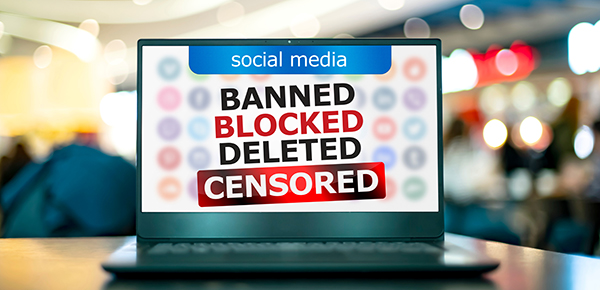UK’s Online Safety Act comes into effect: The dangerous, slippery slope of censorship laws
12/18/2024 / By Willow Tohi

- The UK’s Online Safety Act, passed in 2023, mandates social media platforms to remove illegal content under British law, with penalties including fines of up to 10% of global revenue and potential jail time for non-compliance.
- The Act lists over 130 illegal acts, including content that “stirs up hatred,” raising concerns about subjective interpretation and potential abuse by regulators to suppress legitimate speech.
- The legislation risks stifling dissent and silencing voices, as platforms may censor content to avoid financial penalties, particularly affecting smaller entities with limited resources.
- The Act applies to over 100,000 companies worldwide, raising concerns about the UK exporting its censorship regime and undermining global internet freedom and the free flow of information.
- Free speech advocates warn that the Online Safety Act is a step towards government censorship, emphasizing the importance of resisting such laws to preserve freedom of speech and the free exchange of ideas.
The United Kingdom’s latest attempt to regulate online content has officially come into force, sparking serious concerns among free speech advocates. The Online Safety Act, passed in 2023, mandates that social media platforms like Meta, Google, and TikTok remove a broad range of content deemed illegal under British law. Failure to comply could result in fines of up to 10% of a company’s global annual revenue, with repeat offenders facing even harsher penalties, including potential jail time for individual managers. While the stated goal of the legislation is to combat illegal activities such as incitement to terrorism, human trafficking, and child sexual abuse material, the implications for freedom of speech and the free press are deeply troubling.
The Online Safety Act, enforced by Ofcom, the UK’s media and telecommunications watchdog, sets a dangerous precedent by expanding the government’s reach into the digital realm. The guidelines published by Ofcom list over 130 illegal acts that platforms must prevent, including content that “stirs up racial hatred” or “hatred on the basis of religion or sexual orientation.” While these acts are already illegal under British law, the vague and subjective nature of such definitions raises serious questions about how they will be interpreted and enforced. What constitutes “stirring up hatred”? Who decides? These ambiguities open the door to potential abuse by overzealous regulators, who could suppress legitimate speech under the guise of combating illegal content.
The most alarming aspect of this legislation is its potential to stifle dissent and silence voices that challenge the status quo. While the original draft of the Online Safety Act included a clause banning “legal but harmful” content – a provision that was rightly criticized as legislating “hurt feelings” – the current version still leaves room for abuse. The government’s ability to fine companies up to 10% of their annual revenue creates a chilling effect, encouraging platforms to err on the side of censorship to avoid financial penalties. This is particularly concerning for smaller platforms and independent voices, which may lack the resources to navigate the complex and costly compliance process.
Moreover, the Online Safety Act’s application to over 100,000 companies worldwide, from major social media platforms to small online service providers, underscores the global reach of this censorship regime. By imposing these rules on foreign entities, the UK government is effectively exporting its vision of online control, raising questions about sovereignty and the free flow of information across borders. This move threatens to undermine the internet’s fundamental role as a space for open dialogue and the exchange of ideas.
A free and fair public square is more important than ever
The specter of government censorship is particularly troubling in light of recent events. Despite Prime Minister Keir Starmer’s reported consideration of reinserting the “legal but harmful” clause following anti-immigration and anti-Islam riots in August, cooler heads ultimately prevailed—for now. However, this near-miss serves as a stark reminder of how easily such legislation can be weaponized to target unpopular or controversial opinions. The government’s willingness to entertain such measures should send a clear message to free speech advocates: the fight for liberty is far from over.
As conservatives who value the sanctity of free speech, we must remain vigilant in the face of such encroachments on our fundamental rights. The Online Safety Act is not just a law; it is a tool that empowers the government to control what we say, think, and share online. History has shown us time and again that governments cannot be trusted with such power. Once the door to censorship is opened, it is nearly impossible to close.
In an era where the free press and individual expression are under constant threat, we must stand firm in our belief that the marketplace of ideas should be free from government interference. The UK’s Online Safety Act is a step in the wrong direction, and it is our duty to resist it at every turn. Freedom of speech is not a privilege – it is a right, and one that we must fight to preserve for future generations.
Sources include:
Submit a correction >>
Tagged Under:
bias, big government, Big Tech, Censorship, computing, deep state, First Amendment, free press, free speech, Glitch, Globalism, intolerance, left cult, national security, public square, speech police, Suppressed, tech giants, technocrats, thought police, Tyranny, Vote Republican
This article may contain statements that reflect the opinion of the author
RECENT NEWS & ARTICLES
COPYRIGHT © 2017 COMPUTING NEWS



















